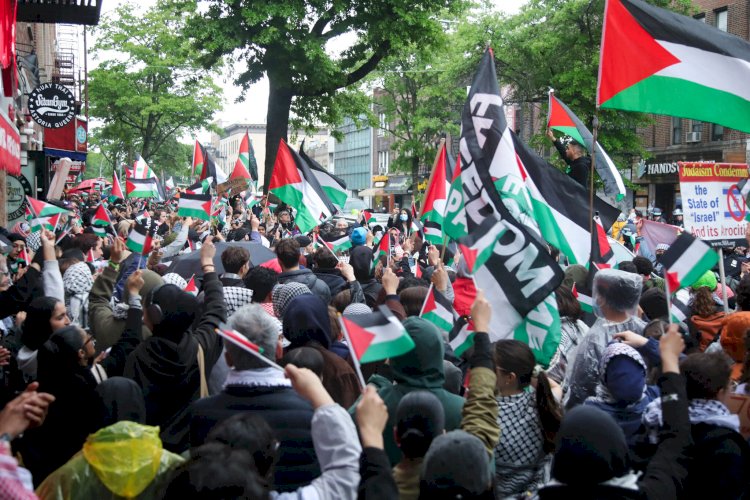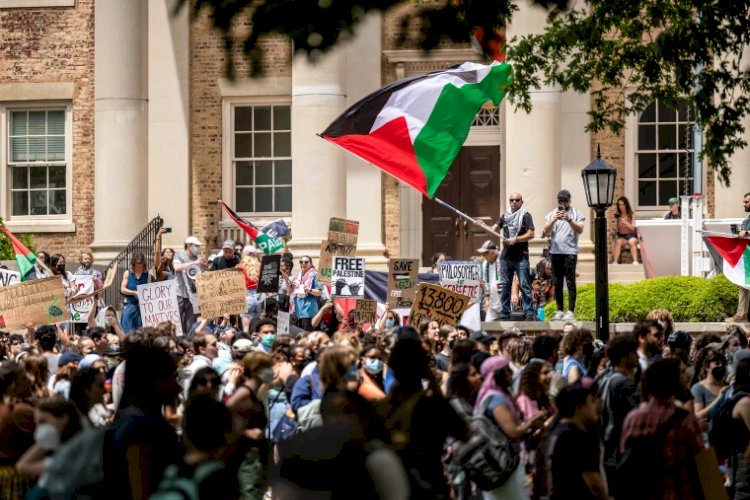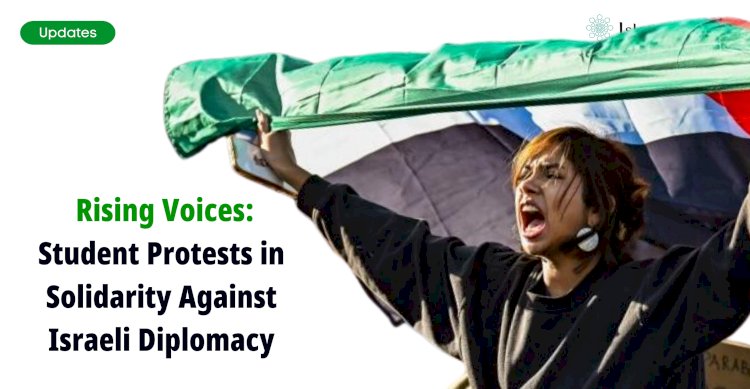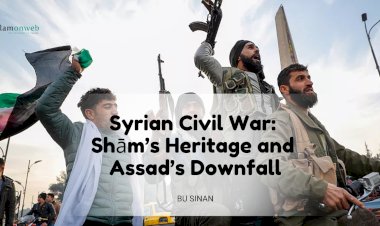Rising Voices: Student Protests in Solidarity Against Israeli Diplomacy
Throughout history, the passionate voices of student action have often predicted profound changes in public awareness. Campuses have been places where opposition is refined, and idealism and action are combined, from the civil rights movements of the 1960s to the fervour against the Vietnam War. In the present, vibrant demonstrations against Israel's actions have sparked a renewed surge of emotion, reminiscent of a period marked by student uprisings and demands for justice.
Student protests in favour of Palestine have grown in popularity in recent weeks. Videos of demonstrators being attacked with weapons and tear gas have gone viral on social media. These horrifying images depict a new low in Western democracy, where a select few profit from state policies that uphold Israeli apartheid, especially the financial class that funds war expenditures and maintains colonial practices. It is reasonable to conclude that nothing in the US, least of all its educational institutions, can be considered democratic. These institutions are, after all, the ruling class's organisational structures, created by the consensus of capitalists and the classes they support to maximise profit.
After initially sweeping across US college campuses, the demonstrations have now spread to institutions in the UK, the rest of Europe, Lebanon, and India. The students claim they are speaking out against their universities' "complicity" in Israel's offensive over Gaza, which has resulted in the deaths of over 35,000 Palestinians. Israel stated that the military assault was in retribution for the October 7 attack by Hamas terrorists, which resulted in the deaths of over 1,200 people and the kidnapping of 250 civilians. Israel's opponents claim that Israel uses such accusations to intimidate supporters, but Israel and its allies have labelled the demonstrations antisemitic. The demonstration organisers, some of whom are Jewish, insist that despite some protestors being captured on camera making violent threats or antisemitic slurs, the campaign is nonviolent and aims to oppose the war and promote Palestinian rights.

Protests on college campuses have drawn international media attention, as have responses from Palestinians confined in besieged Gaza, resulting in more than 2,500 protestors being detained in the US thus far. More than 35,000 Palestinians have died as a result of Israel's conflict in Gaza, and protesters are calling for an end to it. Furthermore, students are urging their institutions and universities to divest from financial links to Israel or businesses that benefit from its attacks on Gaza. The methods and extent of these protests vary. For instance, some students at Yale and Cornell University are calling for their institutions to cut off funding to companies that produce weapons. Students at Columbia University are advocating for divestment from Google, which has a significant deal with the Israeli government, and Airbnb, which permits listings in Israeli settlements in the occupied West Bank.
Students have compared the current campaign to the 1980s activism against businesses involved with South Africa during apartheid. After weeks of student sit-in demonstrations, Columbia University made headlines by selling $39 million worth of stock in corporations such as Coca-Cola, Ford Motor, and Mobil Oil.
In the last two weeks, demonstrators have counted the number of US schools and campuses with protests or encampments. Protests have occurred in 45 states and Washington D.C. Pro-Palestinian demonstrators have also gathered on college campuses in Australia, Canada, France, Italy, and the UK. Students and professors from diverse backgrounds, including Jewish and Muslim communities, have participated in these demonstrations. Organisations like Jewish Voice for Peace and Students for Justice in Palestine are coordinating the protests, which feature interfaith prayers, musical performances, and teach-ins.
While many demonstrations have been peaceful, some university administrations have taken measures to ensure safety. Pro-Israel students argue that their colleges are not doing enough to protect them and that the encampments foster antisemitism. Following Columbia University's crackdown, other universities, such as Northeastern University in Boston, Arizona State University in Tempe, and Washington University in St. Louis, have seen arrests. While most arrests have occurred without opposition, there have been reports of injuries and violent altercations between police and demonstrators. For example, at Emory University, police detained 28 individuals after using a "chemical irritant" to disperse protestors.
In response to the protests, some universities, like Harvard and Cornell, have implemented measures to prevent demonstrations. Harvard Yard was restricted to individuals with valid university IDs, and a pro-Palestinian organisation was suspended for organising an unauthorised rally. Despite government warnings, some protesters have established encampments that have remained for many days. Cornell announced the suspension of several students associated with the pro-Palestinian camp, although it did not provide specific numbers.

The protests have also affected regular campus life. Columbia University transitioned to online courses, and the University of Southern California cancelled its main stage graduation ceremony after the police cleared a pro-Palestinian encampment and arrested numerous protestors. The editorial boards of college publications have criticised university administrations' responses, advocating for students' freedom of speech.
Pro-Palestinian student organisations have long urged their universities to support the Boycott, Divestment, and Sanctions (BDS) campaign against Israel. While some US universities have severed certain financial relationships, none have fully committed to the BDS framework. Demonstrators believe that divestment would raise awareness about their cause and highlight those benefiting from the conflict, even if it has little effect on the situation in Gaza.
This protest has drawn comparisons to the anti-Vietnam War protests of the 1960s. Activists emphasise the similarities between the current demonstrations and those against US engagement in Vietnam, which also involved violent confrontations with police and the National Guard. The deaths of four students in Ohio in 1970 sparked a nationwide student strike, leading to the closure of hundreds of colleges.
References
- Student protests against Israel’s war on Gaza spread across Europe. Aljazeera.com
- Why have student protests against Israel’s war in Gaza gone global? Theguardian.com
- Today’s protests are tamer than the campus unrest of the 1960s. So why the harsh response? Latimes.com
- What is behind US college protests over the Israel-Gaza war? Reuters.com
About the author: Muhammed Nihal K is a second-year student in the Department of Civilizational Studies at Sabeelul Hidaya Islamic College, Parappur, Kerala, India. He is from Karippur, Malappuram.
Disclaimer
The views expressed in this article are the author’s own and do not necessarily mirror Islamonweb’s editorial stance.

























Leave A Comment